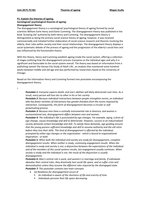Unit 28 P1 P2 M1 Theories of ageing Megan Scully
P1: Explain the theories of ageing.
Sociological/ psychological theories of ageing:
Disengagement theory
The disengagement theory is a sociological/ psychological theory of ageing formed by social
scientists William Earle Henry and Elaine Cumming. The disengagement theory was published in the
book 'Growing old' authored by both Henry and Cumming. The disengagement theory is
distinguished as being the primary social science theory of ageing, however, it was received
controversially and initiated further elaboration of social science research and theories involving the
elderly, their roles within society and their social relationships. The disengagement theory displays a
social systematic debate of the process of ageing and the progression of the elderly's social lives and
was influenced by the functionalist theory.
With this theory, Henry and Cumming establish ageing inside the social system, offering a collection
of stages outlining how the disengagement process transpires as the individual ages and why it is
significant and favourable to the social system overall. The theory was based on information from a
publishing named 'the Kansas City Study of Adult Life', an analysis that monitored some hundred
adults between middle and old age and was performed by researchers based at the University of
Chicago.
Based on the information Henry and Cumming formed nine postulates encompassing the
disengagement theory.
"
Postulate 1: Everyone expects death, and one's abilities will likely deteriorate over time. As a
result, every person will lose ties to other in his or her society.
Postulate 2: Because individual interactions between people strengthen norms, an individual
who has fewer varieties of interactions has greater freedom from the norms imposed by
interaction. Consequently, this form of disengagement becomes a circular or self-
perpetuating process.
Postulate 3: Because men have a centrally instrumental role in America, and women a
socioemotional one, disengagement differs between men and women.
Postulate 4: The individual's life is punctuated by ego changes. For example, aging, a form of
ego change, causes knowledge and skill to deteriorate. However, success in an industrialized
society demands certain knowledge and skill. To satisfy these demands, age-grading ensures
that the young possess sufficient knowledge and skill to assume authority and the old retire
before they lose their skills. This kind of disengagement is effected by the individual,
prompted by either ego changes or the organisation - which is bound to organisational
imperatives - or both.
Postulate 5: When both the individual and society are ready for disengagement, complete
disengagement results. When neither is ready, continuing engagement results. When the
individual is ready and society is not, a disjunction between the expectations of the individual
and of the members of this social systems results, but engagement usually continues. When
society is ready and the individual is not, the result of the disjunction is usually
disengagement.
Postulate 6: Man's central role is work, and women's is marriage and family. If individuals
abandon their central roles, they drastically lose social life space, and so suffer crisis and
demoralisation unless they assume the different roles required by the disengaged state.
Postulate 7: This postulate contains two main concepts.
(a) Readiness for disengagement occurs if:
An individual is aware of the shortness of life and scarcity of time.
Individuals perceive their life space decreasing.




